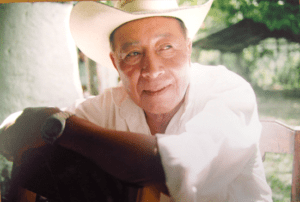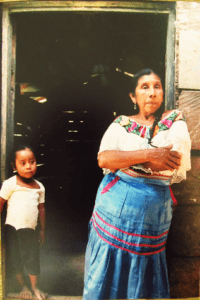Emily Pederson
Yajalon, Chiapas, Mexico
Yashalum Santiago Apostol, A.C.
Since the beginning of July, I’ve been photographing at a community center called SYJAC in San Cristobal de las Casas, Chiapas. Recently Sabás, the director of the center, decided to send me to Yajalon, a hot sleepy small town a few hours away, to spend some time working with a campesino organization called Yashalum Santiago Apostol. Yashalum gives grants and dormitory rooms to students from the Tzeltal and Ch’ol communities around Yajalon so that they can study when their families can’t afford the costs. It was founded by an American priest, Father Loren Riebe, over 20 years ago. One of my colleagues from SYJAC and I spent two weeks there, getting to know the dear people that run it, recording interviews and visiting families to put together a documentary about the organization. The lowdown on Yajalon is this: The municipal capital has potable water, electricity, schools, and a hospital. But in the small and sometimes isolated indigenous communities around it, if there’s a medical clinic at all, it either has no doctors or no medicine. The lack of medical infrastructure causes a lot of tragedies in these villages. As for education, there’s usually only a primary school, less often a middle school. Students have to go to the municipal capital if they want to go to high school, but it’s a long walk away, anywhere from 40 minutes to five hours. If they live far, the only way is for their parents to rent them a room in the capital. Since Dad usually works in the field farming beans and corn and earning just enough to sustain the family, that’s not an option, and indigenous students are de facto shut out of the educational system. And so Yashalum was born, the baby of this problem and the philosophy of Don Samuel Ruiz, the much loved Bishop of San Cristobal who spent his life defending the rights of the indigenous of Chiapas, Guatemala and beyond. It was Don Samuel who taught Father Loren about the ecclesiastical life in Chiapas and sent him to work in Yajalon.
The lowdown on Yajalon is this: The municipal capital has potable water, electricity, schools, and a hospital. But in the small and sometimes isolated indigenous communities around it, if there’s a medical clinic at all, it either has no doctors or no medicine. The lack of medical infrastructure causes a lot of tragedies in these villages. As for education, there’s usually only a primary school, less often a middle school. Students have to go to the municipal capital if they want to go to high school, but it’s a long walk away, anywhere from 40 minutes to five hours. If they live far, the only way is for their parents to rent them a room in the capital. Since Dad usually works in the field farming beans and corn and earning just enough to sustain the family, that’s not an option, and indigenous students are de facto shut out of the educational system. And so Yashalum was born, the baby of this problem and the philosophy of Don Samuel Ruiz, the much loved Bishop of San Cristobal who spent his life defending the rights of the indigenous of Chiapas, Guatemala and beyond. It was Don Samuel who taught Father Loren about the ecclesiastical life in Chiapas and sent him to work in Yajalon.
Yashalum started out small. People from the communities wanted to study, and Father Loren let them stay at the parish, first five, then ten. The demand kept growing, and it evolved into a grassroots organization directed by the locals it affects. Today the organization has two shelter houses for students from the communities, where they stay and get meals for free while studying. It also gives grants of 1000 pesos a month to support university students (about $100), and 300 pesos a month to middle and high school students (about $30). The funding comes from Father Loren convincing families in the United States who have extra money to sponsor a student. But the need is too big for the organization alone to cover, especially in recent years, since the number of sponsors has dropped since the US’ economic collapse. Out of the 110 students that applied for the university scholarships this year, Yashalum can take on 25.
Almost all of the students we met said if it weren’t for their scholarship from Yashalum, they would be working rather than studying. They are also usually the first generation in their family to study past middle school. In the past, racism and the economic order of Yajalon made it unheard of for there to be such a thing as an indigenous professional. The society has become less exploitative and divided in recent decades, but the federal government still fails to build infrastructure in the indigenous towns. Yashalum is having a serious impact on the right to education of these communities: this year 183 students, the majority in college, are being supported by the organization. The most beautiful thing is that education is a right than can lead to the fulfillment of other rights for these communities. Graduates from the program are doctors, human rights defenders, agronomists, engineers. The saddest thing is that a few of them don’t come back home.
 When Father Loren first arrived in the 1970s, sixteen rich families controlled everything in Yajalon. Caciques (large landowners) had been treating the indigenous like little more than slaves for centuries. They were paid for their labor, but just barely. When a cacique sold his ranch, it literally came with all the indigenous that worked on it, as if they were property. So, naturally the project didn’t go over well with the powerful. Helping campesinos get the resources they needed to get an education was something subversive, socialist, to be done away with and fast. The tension boiled over after the Zapatista uprising in January 1994, when a rebel army of indigenous chiapanecos declared war on the federal government and demanded liberty, democracy and justice for their people. None of the major battles took place in Yajalon, but fear that the guerilla would spread hung over the place like a storm cloud; in Ocosingo, just an hour away, one of the ugliest clashes between the Zapatistas and the army had gone down in the central market. The powerful families of Yajalon began to wonder more and more about what on earth Father Loren was doing with all those indigenous people down there at the ranch. Organizing Zapatistas? Distributing guns? In 1995, the military surrounded Yashalum’s boys’ dormitory, and false charges claiming that Father Loren was a Zapatista leader got him expelled from the country, essentially kidnapped along with 6 other priests who were thrown out under different pretexts. Thousands of people marched in protest, but Father Loren would not win his case until 5 years later, when he was granted permission to return to Mexico as a tourist. He now lives in California, and comes back to Yajalon to visit the communities he had been working with for decades once or twice a year.
When Father Loren first arrived in the 1970s, sixteen rich families controlled everything in Yajalon. Caciques (large landowners) had been treating the indigenous like little more than slaves for centuries. They were paid for their labor, but just barely. When a cacique sold his ranch, it literally came with all the indigenous that worked on it, as if they were property. So, naturally the project didn’t go over well with the powerful. Helping campesinos get the resources they needed to get an education was something subversive, socialist, to be done away with and fast. The tension boiled over after the Zapatista uprising in January 1994, when a rebel army of indigenous chiapanecos declared war on the federal government and demanded liberty, democracy and justice for their people. None of the major battles took place in Yajalon, but fear that the guerilla would spread hung over the place like a storm cloud; in Ocosingo, just an hour away, one of the ugliest clashes between the Zapatistas and the army had gone down in the central market. The powerful families of Yajalon began to wonder more and more about what on earth Father Loren was doing with all those indigenous people down there at the ranch. Organizing Zapatistas? Distributing guns? In 1995, the military surrounded Yashalum’s boys’ dormitory, and false charges claiming that Father Loren was a Zapatista leader got him expelled from the country, essentially kidnapped along with 6 other priests who were thrown out under different pretexts. Thousands of people marched in protest, but Father Loren would not win his case until 5 years later, when he was granted permission to return to Mexico as a tourist. He now lives in California, and comes back to Yajalon to visit the communities he had been working with for decades once or twice a year.
With or without him, Yashalum is still strong as ever. The reason for that may be that instead of trying to control the organization, he rightly trusted the people to know what they needed to do for themselves. It was about them, and so it should belong to them. That philosophy is especially needed in a place like Chiapas, where outsiders to Maya culture have historically denied the communities their autonomy and not given them a say in processes that affect them. The executive council of Yashalum is all Tzeltal and Ch’ol men who have to give up a day of work to meet once a week, but they feel strongly enough about what the organization is doing for their communities to give back. Down in the core of the concept of charity – at least in the way it’s practiced by many do-gooder organizations, and the way it’s viewed by many of the people who donate – lurks an ugly assumption: that you need our help, because you’re not capable of doing it on your own. In place of “giving charity” to the people of Yajalon, Father Loren believed in working in solidarity with them. Today his role is simply to help them get the money they need to do the work, and visit once in a while to give everyone a big hug, kid around about “gringolandia” and “these dangerous Indians,” and eat tamales.
—
Yashalum & the Mission Teaching Foundation
How to Help
emily these photos are great!